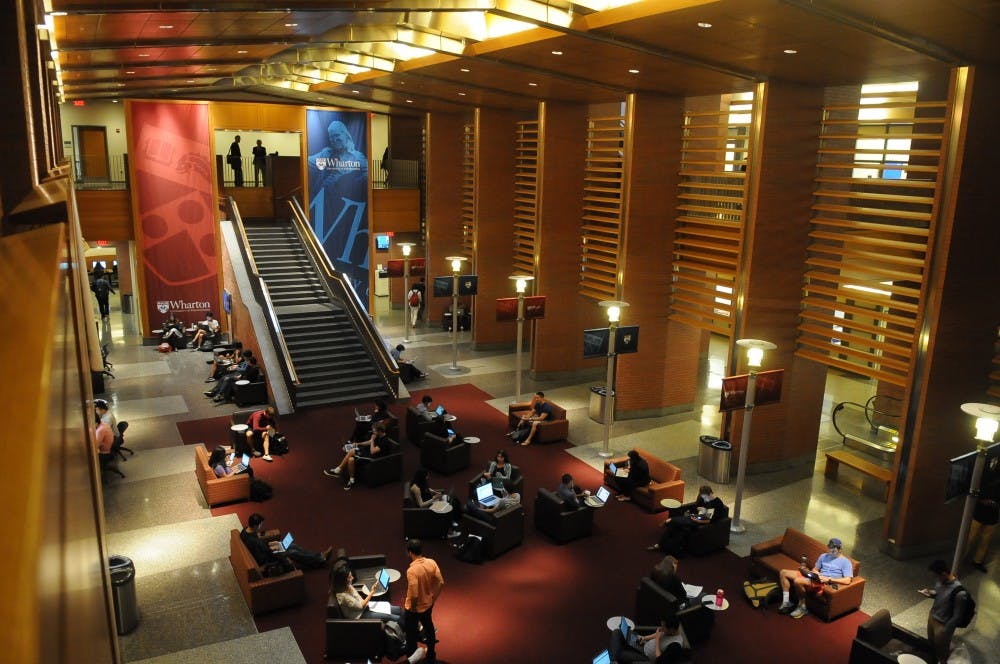
The various Wharton pre-college summer programs require Teaching Assistants, and are staffed by current students. | DP File Photo
While most Penn teaching assistants are preparing for their final recitations of the semester, a handful of TAs are preparing to begin work in one of the most intensive TA positions that Penn has to offer: working as TAs for high school students in Wharton’s various pre-college summer programs.
Residential teaching assistants straddle the line between parent, friend, peer, educator and Penn ambassador for rising high school seniors participating in one of Wharton’s five highly-selective pre-college programs. These programs include Leadership Education and Development (LEAD), Leadership in the Business World (LBW), the Management and Technology Summer Institute (M&TSI), Wharton Moneyball Academy and Wharton Sports Business Academy (WSBA).
Each of the programs is about one month long and is modeled after MGMT-100, a required course for Wharton freshman. Students are divided into small teams and tasked with developing a business plan related to the themes of their particular program. Some programs present their plans at the end of program to a group of judges, which then select a winning team.
Summer RTAs are assigned to head each team and to help to facilitate the team’s business plan development, said Wharton sophomore Richie Lou, a former RTA for LBW. He would frequently take his team to GSRs and guide their discussions. RTAs are also seated at the back of the Huntsman lecture halls to ensure that students are paying attention to the speaker.
RTAs get a very comprehensive picture of their students both inside and outside of the classroom, said Teran Tadal, who selects high school students to participate in LBW and RTAs for both LEAD and LBW. One of the challenges she cited that RTAs have to overcome is students seeing them as friends instead of educators and over-sharing personal information.
Wharton junior Emily Huber, one of the former head RTAs for LBW, agreed. One of the biggest challenges she’s had to tackle as an RTA is helping students manage their stress levels throughout the program. “A lot of these people come in and are really surprised by how competitive the environment is,” Huber said.
She noted that the students represent a pretty good cross-section of Penn’s applicant pool, and that because many are in the top of their class, the pre-college program is the most intense competition they’ve faced. She recalled having to pull students aside on several occasions and help them calm down.
A large source of the stress, Huber noted, comes from students’ belief that success in the program is a ticket to admission to Penn. It isn’t. While there is a team who wins the business plan competition in LBW, LEAD and WSBA, it doesn’t confer any advantage in the admissions game. Grades are not given in any of the programs except for the M&TSI, for which students are awarded college credit.
But at the end of the program, the RTAs send written performance evaluations for each student to Penn’s Admissions Office, based on how they observed students interacting in groups. The evaluations do provide the admissions officers a perspective of how well a given student fits at Penn.
Wharton sophomore Artemis Tiburcio, an RTA and alumnus of LEAD, a program designed to help introduce diverse high school students to the business world, noted that several of her students come from lower-performing high schools and aren’t used to the competitiveness of Penn, while others come from more privileged high schools. She noted that despite the disparities, LEAD participants form a tight-knit community by the end of the program.
Students and RTAs are encouraged to spend time outside of academics. RTAs help to plan various social activities, including field trips to Six Flags, said Bernadette Butler, an administrative coordinator for Wharton’s Undergraduate Division, which helps select RTAs and high school students for LBW.
More informal activities are also encouraged. Lou frequently took his team to Penn Park to play soccer. Meals are often shared, including breakfast at around 7:30 a.m. on weekdays.
While students aren’t always expected to spend time with RTAs, the RTAs are responsible for monitoring students’ recreational times. Jerome Allen, a Wharton sophomore and incoming head RTA for LBW and former head RTA for WSBA, noted that the RTAs must collect students’ Penn cards before their curfew at around 11 p.m. They’re also responsible for ensuring that student travel in groups of three anywhere outside of the Quad.
The selection process for RTAs is an involved one, including a written application and at least one interview. Many of the RTAs are alumni of the programs themselves, and some aren’t Penn or Wharton students.
Many of the RTAs develop close bonds with their students. Lou, who also participated in LBW as a high school student, recalled his team having a particularly close bond with his RTA. His team took her out to Pod at the end of the program. Last summer, his team did the same for him. Lou is still in touch with his team. He’s been helping them make college decisions.
The RTAs also reap some professional benefits. “LBW’s a great experience for these kids because they’re meeting all these cool business leaders ... but you also get to engage with these added benefits,” Lou said. “You get to meet with these top business leaders too and make connections.”
The Daily Pennsylvanian is an independent, student-run newspaper. Please consider making a donation to support the coverage that shapes the University. Your generosity ensures a future of strong journalism at Penn.
DonatePlease note All comments are eligible for publication in The Daily Pennsylvanian.







